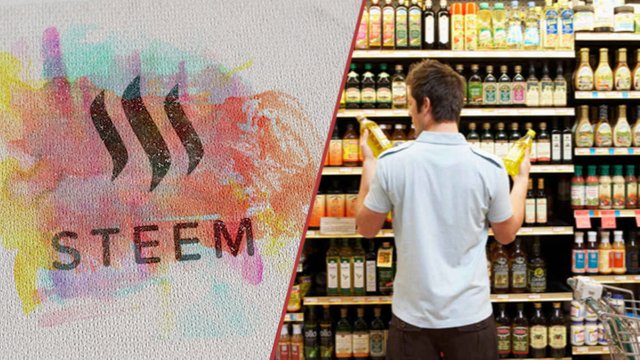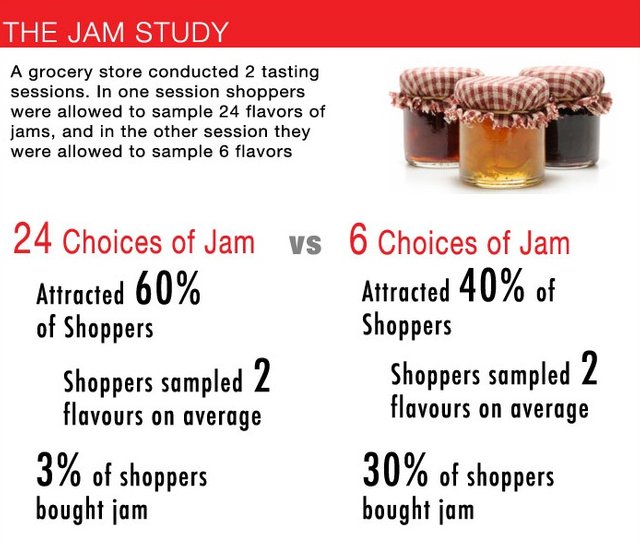Why More Choices Make Us Less Happy - The Paradox Of Choice

Life is full of choices.
From the moment we wake up to the end of the night when we fall asleep, we are given thousands of choices everyday.
Just a few decades ago, that was different - you went to school, maybe to college, got a secure job, got married, had kids, and that's pretty much it.
You would go to the grocery store, buy some local produce, and live happily.
Nowadays, there is so much more Freedom, which comes with many more choices.
People are free to travel or work everywhere around the world, they can choose whether to get married or not or have a career and kids afterwards or none of it.
When we go to the grocery store we can choose between 23 types of gluten-free, sugar-free, organic, soy-based or vegan cereal.
And thanks to globalization we can now not only purchase local products, but delicacies from all over the world!

All of this sounds amazing , and it IS in many ways.
We can live our lives much more freely now, and that's great - but this abundance of choice also comes with some negative effects.
In 2004, Psychologist Barry Schwartz published the book "The Paradox of Choice - Why More Is Less".
And there he mentions how sometimes, more choices can make us less happy.
Watch the Author himself, Barry Schwartz, explain the phenomenon here in a TED Talk:
Effect #1 - Decision Paralysis
The more choices we get, the harder it is to decide. That's a given.
But studies have shown that even when people had the chance to receive something very positive (beneficial retirement plans), if there's too much choice, they tend not to choose anything at all.
Coming to a conclusion with many different choices is so difficult that people like to delay the choice until tomorrow, and tomorrow, and tomorrow.
And then in the end, the deadline ends or they forget about it, and they haven't made any choice at all.

Effect #2 - Less Satisfaction, More Expectation
Even if we manage to make a decision and choose one of the 23 types of cereal, we often end up being less satisfied with it compared to when we had less choices.
Let's say you get home, try the cereal, and don't like it.
You will probably feel annoyed and think about all the other options you have had and why you didn't choose any other cereal that would've tasted better!
Even if all the none of the other types of cereal would have tasted better, the choice we had makes us regret our decision and therefore takes away from the satisfaction we get.
Additionally, when we're offered an abundance of different options, we automatically raise our expectations. We assume that just because there are 23 types of cereal, surely one of them must be incredible - and even if we choose one that tastes good, we still expect that it could've been better.

In 2014, 10 years after the publication of his book, Schwartz was interviewed again about the Paradox of choice.
He was asked what he thought has changed and which factors influenced the paradox of choice or have shown that he was right.
Schwartz answered that the phenomenon has grown, everything has gotten even more options and choices instead of less.
Additionally, things like social media raise people's expectations even more, and make them unhappy when they compare themselves to others.
"My suspicion is that Social Media and dating sites have created just the thing I talk about in connection with consumer goods: Nobody’s good enough and you’re always worried you’re missing out. I see this as an extension of what I wrote about at a time when it wasn’t really going on much."And when asked about the fairly recent term “*FOMO*” (Fear of Missing Out):
"It seems to me that it’s a perfect description. I wish I had thought of that term 10 years ago. Now, it’s just commonplace. (...)Nobody makes plans because something better might turn up, and the result is that nobody ever does anything.
Images: 1, 2, 3, 4, Sources: 1, 2, 3, 4, 5
- Instagram -

© Sirwinchester
Decision Fatigue is greatly underestimated I think. The military does have its eyes on it, and commercial pilots and their bosses... but who else?
btw: Decision fatigue is one of the factors why poor people often make so bad choices - simply because they have to do MORE. They have to think about every cent they spend (or cannot spend).
A "wealthy" person in contrast can (if he feels so) just throw in whatever he wants and pay.
That's right, interesting!
I feel like it's also a concept that many marketing specialists don't understand.
Everything always gets more options instead of making the decision easier!
I agree somewhat. Personally I like to have many options. The devil is in the details. For the jam (if I were really into jam) I would compare prices and buy the cheapest first. Then I would buy a different brand each time until I found the one that was the best quality for the lowest price.
The problem lies in us I think. If we did more shopping and less following the flashing lights of the advertisers, we would probably see a lot of those choices disappear due to lack of interest. I pretty much know what I want before I ever step into a shop. Salesmen hate me! My wife on the other hand... ;)
Thanks for sharing..
Good luck.!!!
@sirwinchester
Happy to hear you enjoyed it and thanks for the comment!
you are welcome @sirwinchester
The jam study is very interesting! Cool post @sirwinchester! Cheers!
Thank you! :)
Yes I thought that was very interesting as well. More choices attracted more customers, probably because it looked more appealing or interesting, but less people ended up purchasing the jams.
Very interesting. Thanks for sharing.
Thank you and glad you liked it!
The only place where I find readable posts is steemit.
Nice post, followed & steemed & upvoted & shared on facebook.
Awesome, thank you for the support! Appreciate it!
I can definitely relate to decision paralysis.
Yes, sometimes all the options we have are so annoying that we put it off and never come to a decision at all.
That is true. I think one reason is because there are so many brands that are selling what is fundementally the same thing with different packaging. It is prudent in modern times to tightly hone your bs detector so you can quickly spot the diamond in the rough. This internet classic sums it up I think: NSFW http://www.theonion.com/video/sony-releases-new-stupid-piece-of-shit-that-doesnt-14309
This post has been ranked within the top 10 most undervalued posts in the second half of Mar 22. We estimate that this post is undervalued by $23.86 as compared to a scenario in which every voter had an equal say.
See the full rankings and details in The Daily Tribune: Mar 22 - Part II. You can also read about some of our methodology, data analysis and technical details in our initial post.
If you are the author and would prefer not to receive these comments, simply reply "Stop" to this comment.